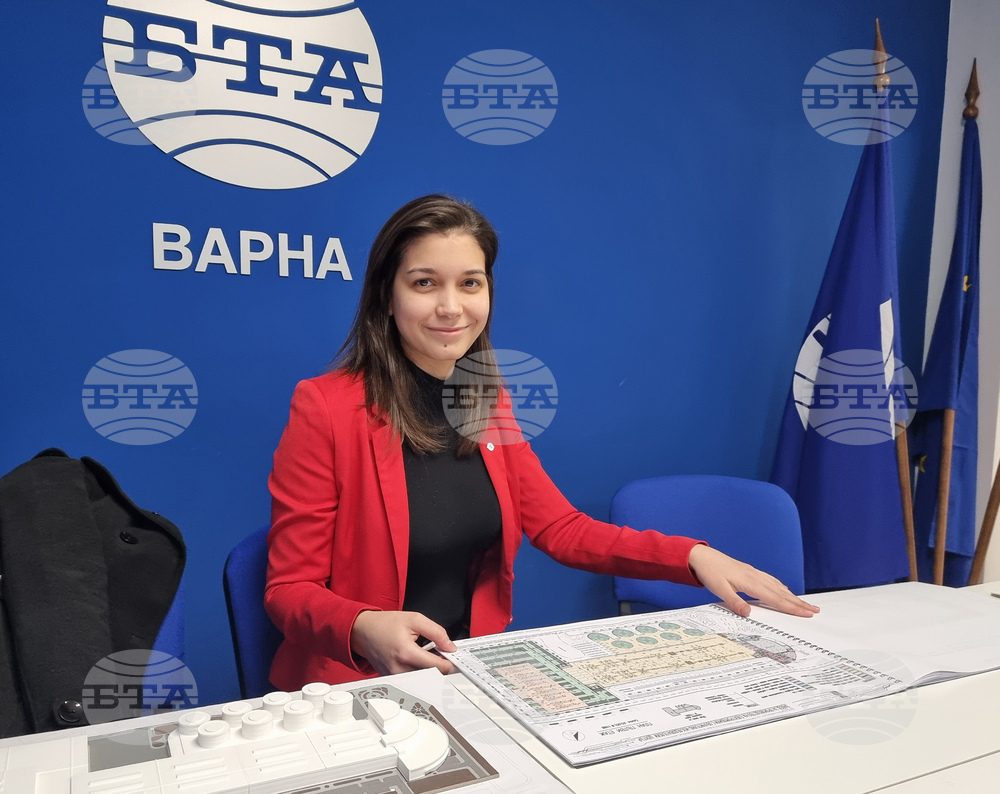Previous version of our website: old.vfu.bg/en
THE GRADUATE JACQUELINE ANGELOVA - WINNER IN THE COMPETITION OF VARNA SCIENTIFIC AND TECHNICAL UNIONS SPEAKS IN FRONT OF BTA
06 February 2024

The young Varna architect Jacqueline Angelova designed an electric vehicles plant with a training and research center for new technologies. With that project, she won first place in a competition of the Scientific and Technical Unions in Varna for 2023. This is her diploma work at Varna Free University "Chernorizets Hrabar".
The plant is developed on 86 acres, on 43 of which an industrial building with 105 acres of built-up area is being erected. It has automated vertical parking lots as warehouses for finished products. They have 5 to 9 floors with an average of 36 places. The project is for the production of electric car coupes only, the designer explained in an interview for BTA. There are two main flow lines. The research center is situated on several floors with conference and lecture rooms and laboratories with a panoramic view of the production area, which is also equipped with walkways.
"This is the only designed electric vehicle plant in our country", she said. The preparation of her diploma work took about two years with all the preliminary studies and the development of a project and a 1:1000 model. Arch. Angelova believes that the project could be implemented in Bulgaria, but if there is investor interest, she plans to update it. As a student, she had the opportunity to graduate in six scientific fields and she chose her passion - industrial sites, combined with her interest in motoring. A big difficulty in the preparation was finding a technologist for the production, and in the end her father, who is an engineer, helped her.
However, the electric cars included in this project are not the ones that arch. Angelova would like to be produced in our time. The reason is that they run on batteries that need to be recycled when their life is over, but since this does not happen completely yet, the devices are "buried" in special places and this makes them less environmentally friendly, she explained. In her project, the young specialist sets up a research center working on the ideas of Nikola Tesla's pulse and magnetic motors, which produce energy by themselves or are charged from independent sources. My wish is to create such engines in the future, and that's why only the car coupes without the batteries are made in my factory, and new propulsion technologies are experimented in the scientific center, explained the author.
To design her plant, she looked into several cases, most notably the Fiat factory in Lingotto, Italy. It is of the urban type and it is supplied with ready-made elements that are assembled on site. Angelova emphasized that there are car factories where everything is made from the bolt and the nut to the complete product, but they are huge. "I've done something medium-sized, brought out on the edge of town, where the elements come semi-assembled, because otherwise a very large area would have to be developed," she added.
Jacqueline Angelova has known since the fifth grade at school that she wanted to study architecture, so she enrolled at the Vocational High School for Construction, Architecture and Geodesy in Varna, which she says is currently on the rise. She then studied architecture at Varna Free University, where from she graduated months ago. She believes that the team of lecturers in the specialty is well-built and trains students well in both technical sciences and arts. The lecturers also teach students to think differently, she stressed.
She is only 26 years old but the young specialist has enviable experience in the profession. She worked in Devnya, at several sites in Varna as a surveyor, general worker, construction technician, which was her qualification degree at high school. She even drove an excavator. She was a draftsman on residential projects, from which she says she gained a wealth of experience as an architect. For her realization she was helped by arch. Emilia Rasheva, who gave her an insight into the overall functionality of the buildings. However, Angelova does not see development in this sector, because for her all buildings under construction are done using the same principle. Now she is engaged in industrial construction in a large company that has a branch in Varna, but she has the desire to teach in secondary education in order to pass on his experience to future architects, engineers and builders. She believes that she can combine teaching with his design work.
The profession of the architect requires dedication and one must work with passion, not for prestige, the young woman added. Asked if it is important for the specialist to be able to draw by hand, she shared the view that now the drawing is done on a computer, but it is good to start from the white sheet. According to her, in recent years, the control over construction has strengthened and more meaningful and high-quality buildings can be seen. According to her, an important condition for the development of a beautiful building is the availability of financial resources and the matching of the views of style of the investor and the designer. The work on the restoration and preservation of the cultural heritage is not in her sphere of interest, but she does not approve of the combination of old buildings with completed new elements and storeys. According to her, a cultural monument should remain as such, and even if the structure is changed, the vision that covers it should be from the relevant time period.
Read the original text here►

